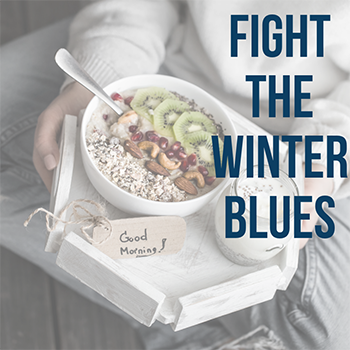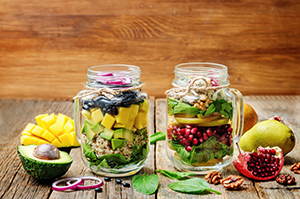|
|
|
|
 The winter blues are very common, especially as we come off the festivities of the holiday season and into the cold and dark months that January and February bring. During this time, you may find yourself feeling down and overall more lethargic. One of the primary culprits of winter blues is the lack of natural sunlight during the fall and winter months, along with a possible increase in refined carbohydrates, sugar, and fats from holiday festivities.
While battling the winter blues is never fun, there are some foods that can actually help combat your gloomy feelings. This month I will be sharing with you my best nutrition and lifestyle tips to fight the blues and improve your energy! |
|
|
Eat More Plants to Fight the Winter Blues
|
|
 Research has found that eating a plant-based diet can significantly improve depression, anxiety, and overall productivity. Between you and me, even if you are not struggling with the winter blues, who isn’t looking to be more productive in 2019? Isn’t that why New Year resolutions are so popular? Anyway, keep reading as I share tips on how to eat more plants to fight depression, decrease anxiety and increase productivity. Research has found that eating a plant-based diet can significantly improve depression, anxiety, and overall productivity. Between you and me, even if you are not struggling with the winter blues, who isn’t looking to be more productive in 2019? Isn’t that why New Year resolutions are so popular? Anyway, keep reading as I share tips on how to eat more plants to fight depression, decrease anxiety and increase productivity.
Your mood-boosting answers are in eating more antioxidant-rich foods
Researchers have found a link between an increase in fruit and vegetables with a decrease in depression, anxiety, and overall poor mental health. Foods rich in antioxidants and phytochemicals help combat inflammation, reducing oxidative stress in the brain and let’s face it, any way to reduce stress, is a very good thing! A few foods rich in antioxidants that are also associated with a boost in one’s mental health include blueberries, raspberries, strawberries, blackberries, spinach, kale, and apples.
Snack on foods that promote a boost in serotonin
Serotonin is a chemical believed to boost mood and promote healthy sleeping patterns, something the winter months often disrupt. Eating foods that are high in the essential amino acid, tryptophan, help your body produce more serotonin. Plant-based foods that are high in tryptophan include spinach, soy, nuts, and seeds. Salmon, poultry, and eggs are also good sources of tryptophan.
Munch on sunflower seeds, pumpkin seeds, flaxseeds, and chia seeds
Rich in omega-3 fatty acids and also naturally high in tryptophan, seeds are powerful in helping to boost mood and fight depression. Next time you are looking for something to munch on, swap out your standard bag of chips with a handful of sunflower or pumpkin seeds. Other ways to incorporate more mood-boosting seeds into your diet include adding flax or chia seeds to your oatmeal, smoothies, salads, whole grain pancakes, and muffins.
Sip on green tea
In a study published by the Public Health of Nutrition, people who consumed about four cups of green tea a day had about a fifty percent chance of feeling happier than the non-green tea drinking counterparts. The study found the more green tea a person drank, the less depressed they felt. Not only is green tea rich in antioxidants, but the actual ritual of making and sipping on hot tea can help slow down and calm the mind, resulting in a positive mood shift.
Spice things up in the kitchen
Using spices for medicinal treatment has been going on around the world for thousands of years. Research has revealed that spices can be effective in improving mental health and well-being. Some of the most powerful mood-boosting spices include turmeric, cloves, capsaicin, cinnamon, and nutmeg. Please note that while nutmeg is a good mood-boosting spice, consuming two or more teaspoons at a time can be toxic.
Moral of the story - eating more fruits and vegetables can help fight the winter blue by making you feel happier, calmer, and more energetic.
|
|
|
|
|
Featured Recipe
Mason Jar Salad |
|
|

- 1/4 cup balsamic vinegarette
- 2 cups spinach
- 2 cups quinoa, cooked
- 1 medium avocado, diced
- 1 mango, diced
- ½ cup black beans
- 1 tomato, diced
- 1/2 red onion, diced
To assemble the salad, place 2 tablespoons of salad dressing in the bottom of the canning jar, followed by 1/2 cup spinach, ½ cup of cooked quinoa, ¼ avocado, 1/4 cup mango, ¼ cup black beans, ¼ tomato, and 1 Tbsp red onion. Twist lid tightly to seal the jar. Shake and serve immediately, or store in the refrigerator for future use.
| |
| |
|
|
"Good humor is a tonic for mind and body. It is the best antidote for anxiety and depression. It is a business asset. It attracts and keeps friends. It lightens human burdens. It is the direct route to serenity and contentment."
— Greenville Kleisser
|
|
|
|
| Beyond Plants, 5 Ways to Boost Your Mood |
|
|

- Soak up sunlight. Sunlight helps to naturally boost serotonin production and overall mood, therefore during the winter months, it is essential to get outside.
- Exercise at least 30 minutes a day. Often referred to as nature’s antidepressant, exercise boost serotonin and endorphin levels, resulting in an immediate mood lift. For this reason, maintaining a regular exercise schedule during the winter months is essential.
- Stick to a regular sleep schedule. Normalizing your circadian rhythms, your body’s physical, mental, and behavioral patterns, are essential to managing the winter blues. One of the best ways you can do this is by creating and sticking to a regular sleep schedule.
- Avoid overindulging in simple carbohydrates and high sugar foods. While it’s tempting to overindulge sweets due to the immediate “feel good effect”, this feeling is usually temporary and followed because by a quick drop leading to feelings of depression. Combat the desire to overindulge by incorporating more of the tips discussed above and eating a plant-based diet.
- Make time for fun. Even when you don’t feel like getting out of the house, make plans to do the things you enjoy and be with people who energize you. Stay connected with your loved ones and ask for their support in helping you beat the winter blues this season!
|
|
|
|
|
| ABOUT SO Nutrition |  Stephanie Leipprandt Ouellette, MBA, RDN, LD
Stephanie Leipprandt Ouellette, MBA, RDN, LD Stephanie has been working in the field of nutrition and dietetics since 1995. She earned a Bachelor of Science degree in Dietetics from Michigan State University, completed an Approved Pre-Professional Practice Program at Western Michigan University and earned a Master of Business Administration from Baker College. She’s been a Registered Dietitian Nutritionist since 1996 and licensed in Texas since 2007. In 2008, Stephanie earned her certification in Childhood and Adolescent Weight Management. Stephanie has extensive clinical & managerial experience, both in corporate settings and in the community. Now she wants to share her knowledge with you, because most (if not all) nutritional habits begin at home.
Stephanie and her family reside in Katy, Texas
| |
| Copyright © 2018 Customized Nutrition Newsletters, All rights reserved. |
|
|